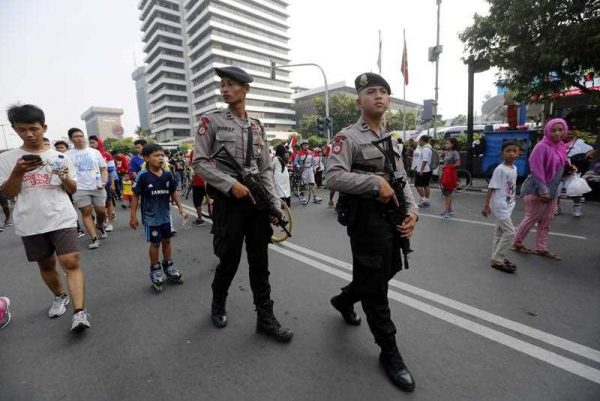Two bombs were detonated at a Starbucks Café and a traffic police post, with a third bomb exploding in the face of one of the jihadists. Three improvised grenades were also thrown at police and two of the attackers drew guns and fired on the police and bystanders. All four attackers died, as well as four civilians, including one foreigner, a Canadian. In the following days, the perpetrators were identified as Dian Juni Kurniadi, Ahmad Muhazan, Muhammad Ali and Sunakim alias Afif.
Several aspects of the attack were new for an Indonesian operation. First, no previous major attack involved the use of either handguns or grenades. The use of guns was almost certainly inspired by the Paris attack in November 2015.
Second, the location, in a bustling part of the capital where a large number of Indonesians mingled with a smattering of foreigners, was unusual. Prior attacks had specifically targeted sites where foreigners predominated or were present in sizeable numbers, thus reducing the risk of Muslim casualties.
Third, this was the first attack in Indonesia and indeed Southeast Asia with a confirmed endorsement from the so called Islamic State (IS). Shortly after the operation IS claimed responsibility and subsequent investigations have confirmed the perpetrators’ pro-IS orientation.
The attack itself was amateurish and the perpetrators must surely have planned for a far higher death toll than four civilians, especially given that hundreds of people were in the vicinity. They would particularly have hoped to kill multiple policemen and foreigners, their main targets.
The bombs contained low explosives and were far below the sophistication and lethality of the bombs used by Jemaah Islamiyah operatives in the major terrorist operations between 2000 and 2009. The two gunmen also proved to be of low competence. Despite numerous nearby targets, they succeeded only in shooting dead a Muslim fellow citizen. If Paris had been the model, then this attack was a shambles by comparison.
Within hours of the attack, Indonesian police identified Bahrun Naim, a senior Indonesian commander with IS in Syria, as the mastermind behind the attack. This is plausible, though no evidence of Bahrun specifically ordering the operation has yet been made public. Bahrun is unusual among prominent Indonesians in IS in that he has enjoined jihadists in his homeland to launch attacks against their ‘un-Islamic’ government and ‘infidels’ rather than travel to Syria and Iraq to fight with IS.
Police claimed that Bahrun was motivated chiefly by a rivalry with Filipino jihadist groups in Mindanao which had, several days before the Sarinah attack, professed loyalty to IS and claimed to be the centre of IS leadership in the region. While this explanation cannot be ruled out, it may not be the most likely motive.
It is difficult to believe that IS central leadership would be much impressed by the Filipino jihadists. Few Filipino Muslims have joined IS’ forces — unlike in Indonesia and Malaysia, which have probably supplied between 350 and 450 fighters. Jihadist activity in Mindanao is sporadic, often more criminal than Islamically inspired, and unlikely to have any influence beyond isolated regions in the southern Philippines.
In the past few days a more credible version of events has begun to emerge. Indonesia’s leading news magazine, Tempo, has reported that the key figure behind the attack was Aman Abdurrahman. Aman has long been regarded by terrorism scholars as the most influential and dangerous jihadist leader in Indonesia. He is not only the leading jihadist intellectual, with an ability to quickly translate and disseminate new thinking from Middle Eastern sources, but he is also a persuasive advocate for some of the most militant interpretations of jihadist doctrine.
When Aman declared his support for IS in 2014 he was one of the first Indonesian jihadists to do so, and he has been instrumental in propagating IS thinking ever since. In early 2015 Aman appealed to Indonesia’s disparate array of pro-IS groups to unite within his Jamaah Ansharut Daulah and later ordered the establishment of district paramilitary units (asykari) in preparation for attacks. Aman is also a mentor to Bahrun.
Tempo quotes security service and jihadist community sources as saying that the Sarinah attackers met Aman in his prison cell three times last year, during which Aman reportedly encouraged them to prepare for an attack. Also present was Aman’s fellow prisoner, Rois, who is on death row for his role in the Australian embassy bombing of 2004. Rois is said to have given technical and operational advice to the plotters. Several of the Sarinah attackers attended training in West Java in late 2015, which included instruction in the use of firearms.
The botched Sarinah attack and the involvement of Aman Abdurrahman and Bahrun Naim almost certainly means that further, probably more lethal, terrorist attacks will occur in Indonesia. Pro-IS jihadists will regard the Sarinah attack as a failure due to the relatively low death toll. They will be determined to have higher casualty operations in the future. Aman and Bahrun bring a virulent militancy to their jihadism and they will undoubtedly continue to draw recruits to the IS cause and persuade followers of the necessity and virtue in ongoing, bloodier attacks.
Greg Fealy is Associate Professor of Indonesian Politics in the Department of Political and Social Change, College of Asia and the Pacific, The Australian National University. He specialises in Islamic politics, culture and radicalism.

